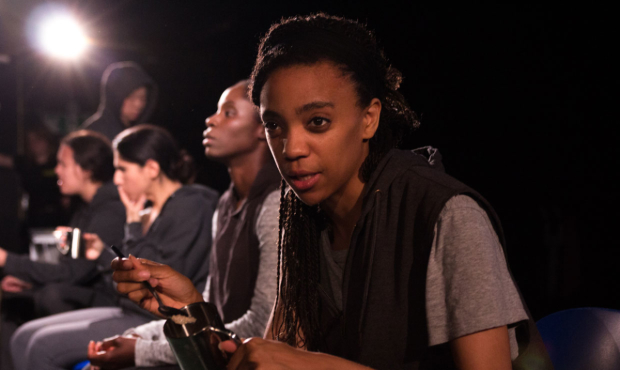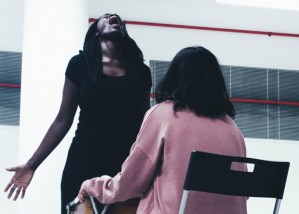Review: The Scar Test (Soho Theatre)
This verbatim piece about Yarl’s Wood detention centre offers a harrowing insight into the mistreatment of detainees in the UK

© Rob O'Kelly
Palestinian-Irish playwright Hannah Khalil has a growing reputation for tackling immigration, deportation and resettlement. Her Radio 4 drama, The Deportation Room, is based on the testimony of people travelling in or out of Gaza and her 2013 work Bitterenders is a black comedy about a Palestinian family in Jerusalem forced to share their house with Israeli settlers. Her new work, The Scar Test (nominated for a Kevin Spacey Foundation Award) is based on verbatim interviews with women at the Yarl’s Wood Immigration Removal Centre in Bedford, a housing centre for women and families awaiting deportation from the UK, which over the years has made headlines for allegations of sexual abuse and hunger strikes among women who have been detained for long periods of well over a year.
The play reveals, through a series of loosely connected scenes, the levels of distress the female detainees are under. While the countries where they come from are not explicitly named, each of the five detainees are escaping oppressive regimes, one (Lucy Sheen's sweetly-lost-looking character) is a lesbian in a country where people are tortured and killed for homosexual acts."You just need to be discreet" is the dismissive response from her interpreter when she tells how her lover was tortured, raped and killed.
The five actors switch seamlessly from guard to prisoner across a small, bare set given an oppressive gloom by Zoe Spurr’s lighting and designer Amelia Jane Hankin’s multiple fisheye cameras hovering overhead. In fact there are 21 parts, divvied up between the five cast members, including lawyers and volunteers who, while they have the detainees’ best interests at heart, are thwarted in their efforts to help by language barriers and the women’s mistrust of them. It’s testament to the skill of the actors that we are able to follow and differentiate the parts, but because there are no central characters whose journey is followed throughout, the script sometimes feels fractured – and it's difficult empathise.
There’s also a really strange motif with giant oversized jumpers, which the detainees pull on to perform solo dance routines, which jerked me out of the action each time. This wasn't an avant-garde directorial decision, yet part of the writer's plan, but I couldn't fathom how it added to the story.
Rebecca Omogbehin, who plays a character who is referred to in the script only as "Tired Lady" because she is too stressed and scared to sleep, has possibly the most incisive moment of the whole play; when the centre’s duty solicitor urges her to explain what happened to her in order to find out if she has a legitimate claim to asylum, Omogbehin (who has the cheekbones of a goddess and a face that lights up the room, by the way) replies by opening her mouth in a wide, silent scream, while we hear gunshots and whimpering play over the speakers. When the sound stops she looks broken and exhausted. The solicitor pushes a pen towards her to sign a contract, saying she’ll represent her. It speaks both to the voicelessness of the women being held in what we are told are prison-like conditions and the unutterable devastation of what they have run from and are soon to be returned to.
This story of injustice wasn’t always so deftly told, with characters sometimes becoming a mouthpiece for thinly-veiled factoids ("Did you know it costs £91 a day to keep me in here?") the worthiness factor rose high. The gender was also a bit of a muddle. I’m all for getting more women everywhere in theatre, and cross-gender casting is all fine and dandy but one of the issues raised about the real-life Yarl’s Wood is even though the people held are 90 per cent female, the staff are 50 per cent male. One scene where this was addressed features a 'male' guard who shows a woman to her cell, suggesting he would be watching her sleep. The woman performing the role of the guard didn't speak and instead a male voice spoke the lines over the speakers. I couldn’t help but think the scene would have made its point more clearly with an actual man, or at least without the disembodied voice.
It was an entertaining 75 minutes and I certainly wasn’t as desperate to get out as those stuck in the notorious detention centre, but the play itself did seem stuck in a limbo between reportage and drama.
The Scar Test is at Soho Theatre until 22 July.













